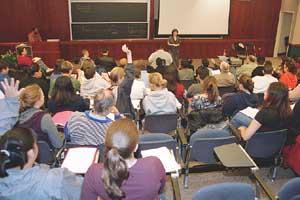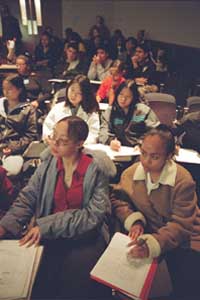Saturday Seminars in Biology continue to inspire high school teachers, students
By Jeanne Galatzer-LevyMedical Center Public Affairs
 Students and teachers from across the city and suburbs come to the Universityķs Biological Sciences Learning Center on Saturdays throughout the school year to learn about biology from faculty in the Biological Sciences Division, the Pritzker School of Medicine and the College. Marsha Rosner (above), the Charles B. Huggins Professor and Director of the Ben May Institute for Cancer Research, gave the Nov. 17 presentation. |
An ideal educational enterprise should enrich teachers and students alike and even enhance the discipline being studied. The Saturday Seminars in Biology program, sponsored by the Biological Sciences Division, aims to create that optimal experience.
Sponsored by a series of grants from the Howard Hughes Medical Institute, the Saturday seminars have provided an opportunity for 150 Chicago and 200 suburban high school teachers and their students to attend lectures at the Biological Sciences Learning Center presented by faculty in the Biological Sciences Division. The Saturday Seminars in Biology meet on the third Saturday of each month throughout the school year. The first lecture of the day is open to teachers and invited students, followed by a more comprehensive lecture open only to teachers. Then, teachers have the opportunity to network with each other and discuss high school biology curriculum issues.
“The quality of research presented makes this program very special. Hughes education grants come through the College, but our unique structure, with shared faculty in the BSD, Medical School and the College, gives us access to extraordinary faculty,” said JosČ Quintans, Associate Dean and Master of the Biological Sciences Collegiate Division.
Marilyn Havelik was teaching biology at Kenwood Academy High School when the lecture series began. “They were small lectures given in the Kent auditorium,”she said. “And they were wonderful. I remember Paul Sereno gave an early lecture,before he was famous, and already he was a terrific lecturer with a good sense of his audience.”
 |
Havelik was enchanted with the early lectures and wanted to bring more into the classroom. She was interested in using University knowledge and resources to bring more enthusiasm about biology to her students. With fellow teachers Richard White and Rita Nelson, she founded STEP, the Science Teachers Exchange Project. STEP has grown with the Saturday seminars program, with teachers meeting regularly after the lecture and developing programs that bring lab experiences to high school classrooms and high school teachers and students into University research laboratories.
Havelik continues to recruit her fellow teachers and brings any interested students to the lectures. “These are really neat lectures. Topics like sickle cell anemia have immediate relevance,” said Havelik.
A broad range of students attend the lectures––bright eighth graders, advanced placement biology students studying at the college level and students who want to boost their grades with extra credit, which the lectures offer. “The total diversity of the students and their responses can be a revelation,” said Havelik. “Students who don’t respond in the classroom can astound you in the seminar with the depth of their interest and understanding.”
Patrick Medina, Grant Administrator for the Howard Hughes Medical Institute Educational Grants in the Biological Sciences Collegiate Division, said, “The lecture topics follow the Chicago Public Schools curriculum. We try to make the topics relevant,” said Medina, who took over the administration of the Saturday seminars this year. “We want the teachers and students to see that what our researchers do is relevant to their lives. JosČ Quintans“ lecture in December is ‘The Immunobiology of Pestilence.’ With bioterrorism in the headlines everyday, it couldn’t be more relevant.”
Harinder Singh, Professor in Molecular Genetics & Cell Biology and a Howard Hughes Investigator, gave the first lecture this year titled “Stem Cell Biology and Its Applications,” a topic that dominated headlines throughout the summer.
This was Singh’s first time presenting at the Saturday seminars, and he said he was so impressed by the interest and understanding the students brought to the seminar that he has approached the University Laboratory Schools about tailoring a lecture to their middle school, where his son attends sixth grade.
“I was impressed by both the teachers and the students,” said Singh. “It’s a wonderful opportunity to encourage talented students. The topic was well chosen to engender excitement, and I was approached to give the lecture because of my interest and expertise in stem cell issues.”
Havelik added, “Students who were turned on to biology in these seminars have gone on to medical school and careers in bioscience. Just the fact that these kids are on the University campus works its magic.”
![[Chronicle]](/images/small-header.gif)